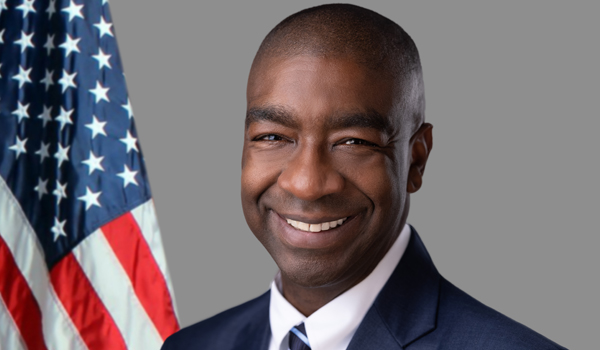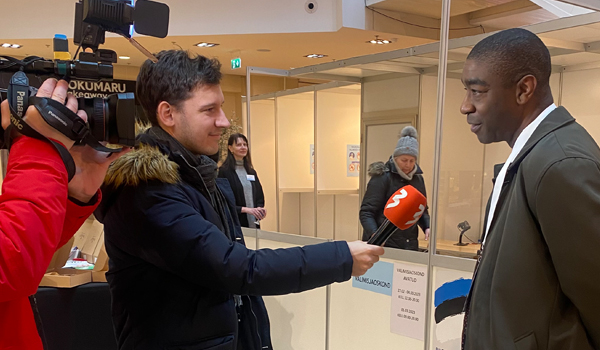
Since graduating from The Catholic University of America Columbus School of Law more than two decades ago, Thomas Hicks ’99 has become an inextricable part of the U.S. Election Assistance Commission (EAC). And as one of four presidentially-appointed commissioners of the only federal agency solely focused on election administration—a creation of the Help America Vote Act of 2002, for which Hicks lobbied following his graduation—he has worked to make election information resources available to the more than eight-thousand election jurisdictions in the United States.
In advance of the upcoming 2024 elections, Catholic Law sat down with Hicks for an interview—not just to better understand EAC’s work, but to find out what advice, if any, he has for the soon-to-be Catholic Law alumni aspiring to long-term roles in public service.
Catholic Law: Can you give a brief overview of the work that the EAC does?
Hicks: The U.S. Election Assistance Commission is the only federal agency that is solely focused on election administration. We came about after the 2000 election and the Bush v. Gore verdict in Florida, and since then we’ve given out around five billion dollars to the states to improve elections processes. Such improvements include new voting equipment, and we offer clearinghouse functions in terms of best practices for election offices. Our agency basically does the best that we can to help the states improve their processes.
Catholic Law: Does the work of the EAC fall into the category of election law?
Hicks: Yes and no. You don’t have to be a lawyer to work at the commission, which is good because non-lawyers can also help to make our election information more accessible to both election officials and voters.
Catholic Law: Have you always been interested in public service?
Hicks: Yes, I went to law school with the thought of becoming a public defender, or serving folks that way—but I had this thing about making a little bit of money so I could still eat and pay off my student loans. But I think that, at the end of the day, I feel good for the things that I’ve done. After the 2000 election, I decided that I didn’t want to see an election be questioned to that level ever again. I started lobbying for the Help America Vote Act (HAVA), and I worked on Capitol Hill shortly after the EAC was created by HAVA. President Obama nominated me to my current commissioner role in 2010, and I’ve been in this role ever since being confirmed in 2014.
And I think that, in terms of the dedication that I feel I have [to the EAC], at the end of the day what I would like for folks to remember me by is that serving others is a decent goal. I think that that is one of the things that I did like about Catholic: There were so many folks who wanted to be part of serving their communities through the government or non-profits.
Catholic Law: Can you share your career path, and tell us the how and why you chose to study at Catholic Law?
Hicks: Catholic is a very good school, and that motivated me to apply. I started studying at Catholic Law as an evening student with the goal of getting my education while saving some money while working for the Clinton administration. When I was at Catholic, there were two things that were really great: I had an externship with HUD [Department of Housing and Urban Development], where I could go there and work in the general counsel’s office. I learned a lot about renters and other aspects of housing. And then the other piece was being allowed to go for a summer—it was through another school, but Catholic accepted the credits—overseas to Australia. I got to see a comparative law program through the University of Adelaide, which I think was very valuable. I think of those as two great learning experiences.
 Catholic Law: What suggestions do you have for law students interested in careers in this area of public service?
Catholic Law: What suggestions do you have for law students interested in careers in this area of public service?
Hicks: Look at more than one thing. Look at externships and associations to identify your passions. That’s how I learned a lot, by working other jobs. So, see what’s out there, and go to events. Go to see speakers when they come to the university, Our General Counsel's office has an employee who says he applied to work for the agency after hearing me speak at CUA.
Catholic Law: Are there any memories about Catholic Law, that you’d like to share, that relate to that piece of advice?
Hicks: There were so many folks who wanted to be part of serving the government or serving non-profits. I think that I’ve never been one to think, “Hey, I want to do these things to be a millionaire or billionaire.” It’s more of, “How can we serve our fellow human beings?” And I think that a little bit of that is what Catholic gave me. But don’t get me wrong: There were still many times where we were able, even as night students, to have a good time. We challenged some of the younger students at some of the other schools in intramural basketball, and I remember one year when we played in the finals. We were pretty good: School was hard, but we still made time to have some fun.
Catholic Law: Lastly, roping back to your work at the EAC, are there any big concerns that you have going into the November 2024 election?
Hicks: Being a part of a federal agency, my biggest fear is that people will be turned off from it and say, “I don’t like either of these candidates. I don’t want to vote. What’s the change going to be?” And I think that, while they might not like who’s running for president, there may be other issues on the ballot that do concern them. I think that you can’t complain if you don’t participate. And my concern for November would be people not casting their votes, and then just tuning things out. There are so many issues out there that affect all of us. Just Vote!
To learn more about the work that the United States Elections Assistance Commission does visit eac.gov.
